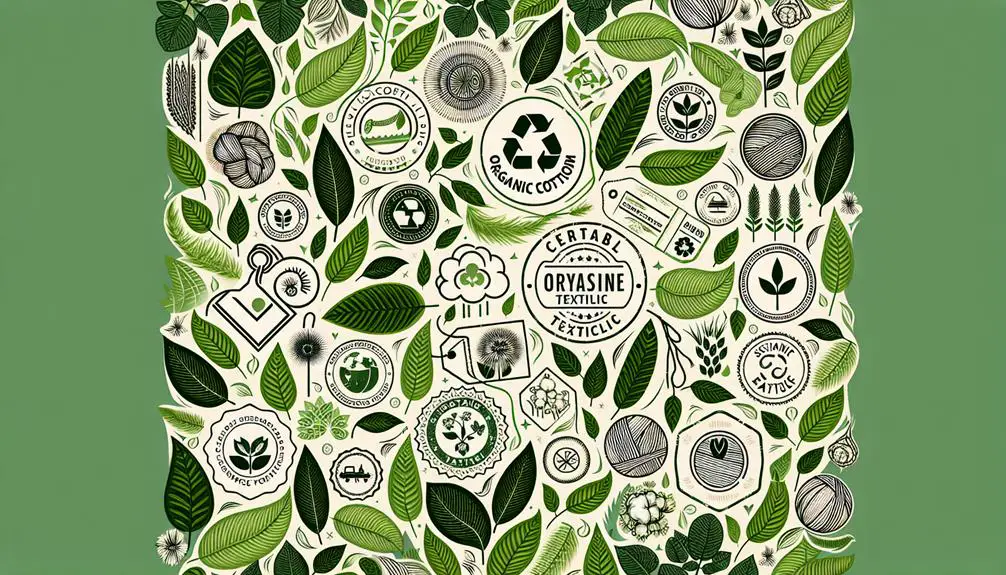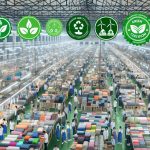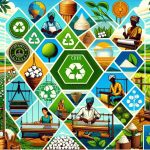When you think about sustainable textiles, certifications like GOTS and OEKO-TEX might come to mind, but do you really understand their significance? These certifications set rigorous standards that guarantee materials meet high environmental and ethical criteria. They guide manufacturers toward better practices and give you the power to choose products that align with your values. However, just knowing these certifications exist isn't enough; you need to comprehend how they impact the entire textile industry. So, what exactly do these certifications cover, and why should they matter to you? Let's explore their broader implications.
Table of Contents
Key Takeaways
- Certifications like GOTS and OEKO-TEX ensure compliance with stringent environmental and social standards in textile production.
- Certified products attract eco-conscious consumers who prioritize sustainability and ethical practices.
- Accreditations verify that production processes are environmentally friendly, reducing water pollution and carbon emissions.
- Ethical labor certifications like Fair Trade confirm fair wages and safe working conditions, promoting worker welfare.
- Certifications provide transparency and build consumer trust by assuring ethical and sustainable sourcing of materials.
Key Certifications Explained
Understanding key accreditations in sustainable textiles empowers you to make informed choices about the products you purchase. When you acknowledge global standards and the certification process behind them, you can better assess the authenticity of sustainability claims.
Accreditations such as GOTS (Global Organic Textile Standard) and OEKO-TEX guarantee that textiles meet rigorous environmental and social criteria. These accreditations aren't just labels; they represent a thorough evaluation of the entire production process, from raw material sourcing to final product distribution.
Accreditations like GOTS and OEKO-TEX carry significant industry recognition, assisting brands in meeting market demand for responsibly produced textiles. When a product bears these accreditations, it's more likely to attract consumers who prioritize sustainability, thereby driving market trends and encouraging more companies to adopt sustainable practices.
Understanding these accreditations means you're not just a passive consumer but an active participant in a larger movement towards environmental responsibility.
Environmental Impact
The environmental impact of textile production can't be exaggerated, as it covers everything from water pollution to carbon emissions. When you explore the production processes, you'll see that traditional textiles often depend heavily on water, energy, and chemicals. This leads to a massive carbon footprint that contributes to global warming and depletes natural resources.
To address these issues, adopting eco-friendly materials is essential. Materials like organic cotton, bamboo, and recycled polyester offer a sustainable alternative. They require less water, fewer chemicals, and generate lower carbon emissions during production. By choosing these eco-friendly options, you're actively reducing the environmental damage associated with textile manufacturing.
Certifications play an important role here. They guarantee that the materials and processes used meet strict environmental standards. Labels like GOTS (Global Organic Textile Standard) and OEKO-TEX ensure that the textiles aren't only safe for the environment but also for consumers. These certifications make it easier for you to identify and choose products that align with your sustainable goals.
In essence, being mindful of the environmental impact and opting for certified sustainable textiles can greatly reduce your carbon footprint and promote a healthier planet.
Ethical Labor Practices
Securing ethical labor practices in textile production means prioritizing the welfare and rights of workers throughout the supply chain. You need to make sure that every individual involved receives fair wages and works in safe, humane conditions. These efforts foster a sustainable industry that values human dignity and integrity.
Certifications like Fair Trade and SA8000 are critical in verifying that brands uphold these standards. They audit companies to confirm compliance with fair wages, reasonable working hours, and safe environments. By sticking to these certifications, you're making a tangible commitment to ethical labor practices.
Your supply chain isn't just a series of transactions; it's a web of human lives. Each link in this chain should reflect your dedication to ethical standards. When you choose suppliers and partners who uphold these principles, you elevate the entire industry. It's not just about compliance; it's about creating a culture of respect and fairness.
Consumer Benefits
Consumers reap significant benefits when they choose products certified in sustainable textiles. First and foremost, you gain access to eco-friendly options that not only reduce your carbon footprint but also support practices that are kinder to our planet. Certified products often come with quality assurance, meaning you can trust that the materials used are durable and well-made, enhancing the longevity of your purchases.
Moreover, cost savings come into play. Sustainable textiles are designed to last longer, reducing the frequency of replacements and thus saving you money in the long run. Additionally, transparency in sourcing assures you that the items you buy are ethically produced, giving you peace of mind and fostering trust in the brands you support.
| Consumer Benefit | Description | Keywords |
|---|---|---|
| Eco-Friendly Options | Reduces carbon footprint, supports the planet | eco-friendly options |
| Quality Assurance | Durable, well-made materials | quality assurance |
| Cost Savings | Longer-lasting products, fewer replacements | cost savings |
| Transparency | Ethical production, brand trust | transparency in sourcing |
Future of Sustainable Textiles
Looking ahead, advancements in technology and innovative practices will redefine the landscape of sustainable textiles. You'll witness how these innovations in textiles transform production processes, making them more efficient and environmentally friendly.
Imagine smart fabrics that adapt to environmental conditions, or new dyes that require less water and energy. These breakthroughs aren't just critical; they're already in development and will soon become mainstream.
In the global market, trends are shifting towards greater transparency and sustainability. Consumers like you're demanding more eco-friendly products, pushing companies to adopt sustainable practices. This shift is creating a ripple effect, influencing everything from farming practices to manufacturing and distribution.
As a result, the entire supply chain is becoming more sustainable, meeting both regulatory standards and consumer expectations.
Certifications will play an essential role in this future. They provide a benchmark for quality and sustainability, giving you confidence in your purchasing decisions. As more companies seek these certifications, you'll notice a broader range of sustainable options available, making it easier than ever to choose responsibly.
Frequently Asked Questions
How Can Small Textile Businesses Obtain Sustainable Certifications?
To obtain sustainable certifications, you'll need to explore funding options and understand compliance requirements. Highlight sustainability benefits in your marketing strategies, ensuring you meet all standards. This approach enhances credibility and attracts environmentally-conscious customers.
What Are the Costs Involved in Getting Certified for Sustainable Textiles?
Oh, you thought getting certified would be cheap? Cost considerations are hefty, but the financial benefits are worth it. You'll invest in audits, documentation, and fees, but those sustainable credentials can boost your market appeal substantially.
Are There Any Global Organizations That Oversee Sustainable Textile Certifications?
Yes, global organizations like GOTS and OEKO-TEX oversee sustainable textile certifications. They enforce global standards and streamline the certification process, ensuring your products meet rigorous environmental and social criteria. You'll find their guidelines indispensable.
How Do Certifications Impact the Marketing of Sustainable Textile Products?
Certifications boost your marketing strategies by enhancing brand credibility and aligning with industry standards. They educate consumers about sustainable choices, making your products more attractive to a knowledgeable audience seeking authenticity and environmental responsibility.
Can Certifications Be Revoked, and Under What Circumstances?
Yes, certifications can be revoked. Revocation circumstances include failure to meet sustainability standards or industry regulations. You must undergo a recertification process to regain your status, ensuring adherence to the required criteria.
- What Is Kona Sheen Fabric and How Does It Differ From Regular Kona? - June 20, 2025
- A Guide to Kona Cotton’s Most Popular Blue Shades: Navy, Royal, and Sky - June 20, 2025
- Understanding the Different Grades of Kona Cotton Fabric - June 20, 2025







